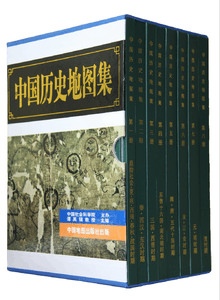Tan Qixiang
| Tan Qixiang 谭其骧 | |||||||||
|---|---|---|---|---|---|---|---|---|---|
 Tan Qixiang (left), Gu Jiegang (center) and Hou Renzhi (right) in 1957 | |||||||||
| Born |
25 February 1911 Shenyang, Liaoning | ||||||||
| Died |
28 August 1992 (aged 81) Shanghai | ||||||||
| Nationality | Chinese | ||||||||
| Fields | Historical geography | ||||||||
| Institutions |
Fudan University Zhejiang University | ||||||||
| Alma mater |
Jinan University (Shanghai) Yenching University | ||||||||
| Known for | Historical Atlas of China | ||||||||
| Chinese name | |||||||||
| Simplified Chinese | 谭其骧 | ||||||||
| |||||||||
| Courtesy name | |||||||||
| Simplified Chinese | 季龙 | ||||||||
| |||||||||
Tan Qixiang (25 February 1911 − 28 August 1992), was a historian who is considered a founder of the field of historical geography in modern China. His magnum opus, the eight-volume Historical Atlas of China, was published between 1982 and 1988.[1][2][3]
Biography
Tan Qixiang was born on 25 February 1911 at a train station in Shenyang, Liaoning. Soon after his birth he was brought back to his home town Jiaxing, Zhejiang. After attending Xiuzhou High School in Jiaxing, he briefly studied sociology at the Shanghai University in 1926 before transferring to Jinan University (then located in Shanghai), where he graduated from the history department in 1930.[2] In 1930 he entered the graduate school of Yenching University in Peiping (now Beijing), where he studied under the prominent historian Gu Jiegang and graduated in 1932.[2] From 1932 to 1936 he worked as a lecturer of historical geography and history at several universities in Peiping, including Yenching, Fu Jen Catholic University, Peking University, and Tsinghua University.[2] In the 1930s Gu Jiegang and Tan Qixiang cofounded the Yugong Society (禹贡学会) and the journal Chinese Historical Geography (Chinese name Yugong).[1]
In 1940 Tan Qixiang joined Zhejiang University, then relocated to inland Guizhou province due to the Japanese invasion of China, as an associate professor. In 1946, after the surrender of Japan, Tan moved to Hangzhou with Zhejiang University, which was moved back to its original campus. From 1947 to 1949 he taught at both Zhejiang University and his alma mater Jinan University in Shanghai. After the founding of the People's Republic of China in 1949, Jinan University was closed and most of its departments were merged into Fudan University, and Tan became a history professor at Fudan, where he stayed for the rest of his career. He was the head of the Department of History of Fudan starting in 1957, and became an academician of the Chinese Academy of Sciences in 1981. From 1982 to 1986 he served as director of the Institute of Historical Geography of China at Fudan University.[2]
Historical Atlas of China

Tan Qixiang's most important work is the Historical Atlas of China, which is also regarded as the most significant work in the field of historical geography in China. He began working on the atlas in 1955, partially based on the work of Qing Dynasty scholar Yang Shoujing (楊守敬). It took him more than 30 years to complete the work, and the eight-volume atlas was published from 1982 to 1988. The atlas consists of 304 maps covering the thousands of years of Chinese history until the Qing Dynasty and includes over 70,000 place names.[3] The atlas contains many maps that are politically sensitive, especially when it involves Tibet and Xinjiang. According to historian Ge Jianxiong, Tan's former student, Tan was under strong political pressure to make the historical Tibet appear smaller, but he insisted on being faithful to history, and his version was eventually approved by China's then reformist leader Hu Yaobang.[3]
Students
Tan Qixiang's students include Wang Zhongshu, who studied history with him at Zhejiang University and later became one of the most prominent archaeologists in Asia.[4] At Fudan University, his students Zhou Zhenhe (周振鹤) and Ge Jianxiong (葛剑雄), both now well known historians, were the first two recipients of the doctoral degree in a humanities or social science field in the People's Republic of China.[5]
References
- 1 2 Chen, Qitai (2006-05-20). 谭其骧的历史地理学研究 (in Chinese). Institute of Qing History, Renmin University. Retrieved 2013-07-31.
- 1 2 3 4 5 谭其骧 (in Chinese). Guoxue.com. Retrieved 2013-07-31.
- 1 2 3 复旦纪念历史学家谭其骧百年诞辰. Dongfang Daily (in Chinese). 2011-02-25. Retrieved 2013-07-31.
- ↑ "王仲殊 [Wang Zhongsu]" (in Chinese). Chinese Academy of Social Sciences. 18 October 2011. Retrieved 23 July 2013.
- ↑ 记全国首批文科博士周振鹤、葛剑雄教授 (in Chinese). Wen Hui Bao. 2008-12-02. Retrieved 2013-08-04.